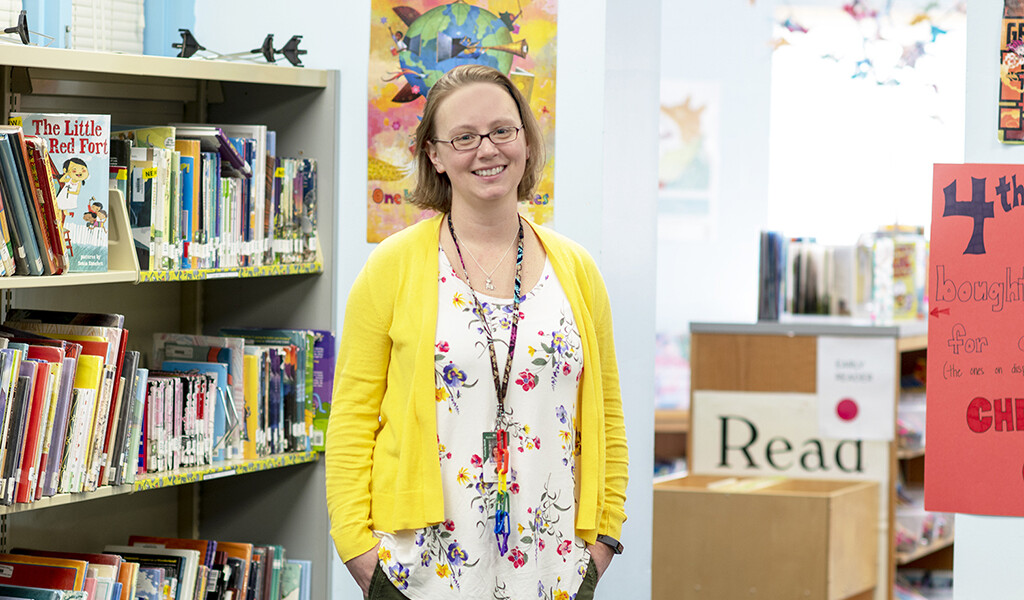Overview
Pursue Your Passion for Education in a Library Setting
The school library media courses are offered as standalone courses that are aligned with the school librarian endorsement for Vermont educators, or as a strand within the Master of Education program within the College of Education and Social Services.
Our six school library media courses are offered in a two-year cycle, one per semester, and are delivered in a blended synchronous and asynchronous online format that is convenient for distance learners.
Admissions
For practicing educators and career changers
Our courses are for you if you’re a practicing educator who would like to add another endorsement to your educator license. If you want to change careers to the field of education and school librarianship, you’ll gain knowledge and hand-on experiences that, along with additional education coursework, can lead to initial certification.
Curriculum
The licensure series is designed to flow as a sequence, with the management course (EDLI 6720) a prerequisite for all other courses. However, the courses may be taken as stand-alone courses or taken out of sequence as circumstances permit with permission of the instructor.
School Library Media Courses are offered in a rotating two-year cycle, one per semester Fall, Spring, Summer.
Program of Study
First Year of Sequence
EDLI 6720
Managing and Leading School Library Media Centers (FALL)
This course examines foundational principles and issues of school librarianship, such as intellectual freedom, equity, and access. Candidates will prepare for organizing and operating a school library media center, with emphasis on leadership and advocacy for planning, policy and procedure development, facility design, personnel administration, and program evaluation.
EDLI 6730
Developing and Organizing School Library Media Center Collections (SPRING)
Explore fundamental concepts for developing and organizing School Library Media Center collections in this course. Equity of access to information resources is a guiding principle that drives collection development, and emphasis is placed on evaluation, selection, and acquisition of resources appropriate for students, staff, and other patrons in contemporary schools in both physical and virtual environments.
EDLI 6770
Information Technologies for School Library Media Centers (SUMMER)
This course explores the planning, instructional use, and management of technology in the contemporary school library media center. Learners will develop competence and confidence in teaching with and using technology. This course explores the ways that technology can support readers, provide access to resources, create community, and give students authentic outlets to communicate their ideas beyond school walls. Course participants will also examine ways to design instruction to teach and promote digital citizenship and media literacy skills.
Second Year of Sequence
EDLI 6760
Information Sources and Services for School Library Media Centers (FALL)
This course focuses on the teacher librarian’s role in the information landscape. Information Sources and Services addresses: research strategies, search tools, information curation, teaching, and evaluation with multimedia digital reference resources to meet the needs of a diverse learning community. There will be an emphasis on virtual library learning spaces which is critical in an anytime, anywhere learning environment.
EDLI 6740
Designing Learning in School Library Media Centers (SPRING)
This course is designed to explore theories and best practices for teaching and learning in today’s school libraries. School Librarians are educators who demonstrate knowledge of learners and learning. They model and promote collaborative planning and assessment, instruction in multiple literacies, and inquiry-based learning which enables members of the learning community to become effective users and creators of ideas and information. School Librarians design and implement instruction that engages students’ interests and develops their ability to inquire, think creatively and critically, build citizenship skills, and gain and share knowledge in a proficiency-based, personalized learning environment.
EDLI 6710
Children’s and Young Adult Literature (SUMMER)
Effective school librarians promote reading for learning, personal growth, and enjoyment. This course is designed as a survey of the context and merit of children’s (CH) and young adult (YA) literature, that is, books written for and read by readers from ages Pre K-Grade 12. The course will examine major trends in children’s and young adult literature, and current issues in the selection of reading materials in multiple formats to support reading for information, reading for pleasure, and reading for lifelong learning. The course also includes a focus on best practices in reading and literacy instruction that enhances opportunities to meet the diverse interests and abilities of all readers.
Library Science: Information Sources & Services (online)(EDLI 6760 OL1)Quick Course ReviewQuick View
CRN95165Credits3InstructorsDeborah Ehler-Hansen- DatesDays of the WeekTimes
- to N/ASee Notes
- to Sat to
Library Science: Information Sources & Services (online)(EDLI 6760 OL2)Quick Course ReviewQuick View
CRN95743Credits3InstructorsDeborah Ehler-Hansen- DatesDays of the WeekTimes
- to N/ASee Notes
- to Sat to
Library Science: Social Justice in Scl Libries (online)(EDLI 6990 OL1)Quick Course ReviewQuick View
CRN95744Credits3InstructorsPeter LangellaDeborah Ehler-Hansen- DatesDays of the WeekTimes
- to N/ASee Notes
- to Sat to
Library Science: Dev/Org Schl Libr Collections (online)(EDLI 6730 OL1)Quick Course ReviewQuick View
This section is closed
CRN15423Credits3InstructorsFaith CarpenterCharles Dabritz- DatesDays of the WeekTimes
- N/A to
- N/A to
- N/A to
- N/A to
Library Science: Dev/Org Schl Libr Collections (online)(EDLI 6730 OL2)Quick Course ReviewQuick View
This section is closed
CRN15794Credits3InstructorsFaith CarpenterCharles Dabritz- DatesDays of the WeekTimes
- N/A to
- N/A to
- N/A to
- N/A to
Library Science: Info Tech Schl Libr Media Ctrs (online)(EDLI 6770 OL1)Quick Course ReviewQuick View
This section is closed
CRN61811Credits3InstructorsDeborah Ehler-HansenArlyn Bruccoli- DatesDays of the WeekTimes
- Mon to
- Mon to
- Mon to
- Mon to
Library Science: Info Tech Schl Libr Media Ctrs (online)(EDLI 6770 OL2)Quick Course ReviewQuick View
This section is closed
CRN61889Credits3InstructorsDeborah Ehler-HansenArlyn Bruccoli- DatesDays of the WeekTimes
- Mon to
- Mon to
- Mon to
- Mon to
- Education
School Libraries Embrace Inquiry, Ideas and Community
In the Richmond Elementary School library, students ask questions and share ideas. Those interactions are exactly why Emily Wood decided to become a librarian.

- Cannabis
- Education
- Health
Journalist Talks Cannabis, Creativity, Science, and Commitment to the Truth
As Mary Jane Gibson saw an opportunity for more factual reporting on cannabis, she decided to pursue the UVM Cannabis Media Fellowship focusing on the Cannabis Plant Bio Professional Certificate. Gibson, who amassed her cannabis knowledge from her work at High Times, was eager to get deeper into the science of cannabis.

- Business
Digital Marketing Certificate to Amplify Your Organization’s Digital Strategy
Digital marketing is an essential component of any successful business strategy. By mastering the fundamentals and staying abreast of emerging trends, you can establish a strong digital presence and make data-driven decisions that propel your organization forward. The University of Vermont’s online Digital Marketing Certificate program offers a comprehensive education designed to empower you with the skills and knowledge needed to thrive in the digital age.

“I’m helping to develop my students love of reading and exposing them to books, ideas, and cultures around the world. I’m also teaching students inquiry skills, helping them develop critical thinking, and how to be responsible citizens.”
Emily Wood, Librarian
Career Outlook
Over the next decade, almost 70 percent of school library media specialists across America are expected to leave their jobs, many due to retirement, according to the American Library Association. In addition, fewer people are going into the profession, resulting in more jobs. In 2016, the number of jobs rose by over 5 percent, according to the U.S. Bureau of Labor Statistics. Some job growth may be tempered by any economic downturn, as schools make cutbacks and eliminate library positions or cut hours.
Careers
Stricter certification rules, federally mandated standards and test scores and the increased role of technology in classrooms and libraries all have led to major changes in the profession. School library media specialists introduce elementary, middle school and high school students to literature and help them locate and select books and other media. They also help students conduct research via traditional media and the Internet, and they may assist teachers in instructing, developing curricula, acquiring and selecting materials or team-teaching.
Further Info
- AASL Learning About the Job: http://www.ala.org/aasl/education/recruitment/learning
- Bureau of Labor Statistics: https://www.bls.gov/ooh/education-training-and-library/librarians.htm
- Vermont Agency of Education educator shortage areas: https://education.vermont.gov/documents/teacher-shortage-areas
Salaries
Library media specialists salaries are similar to those of teachers, according to the National Bureau of Labor Statistics. In 2021, the average Vermont public school school library media specialist was $61,190.
FAQ
Once you have completed the courses and other needed requirements, you may register here to receive your Certificate of Public Librarianship.
The school library media courses are offered as stand alone courses that are aligned with the school librarian endorsement for Vermont educators, or as a strand within the College of Education and Social Services’ Master of Education program.
The six school library media courses are offered in a two year cycle, one per semester, and are delivered in a blended online format that is convenient for distance learners. Fall and spring courses follow the standard semester schedules at UVM. The summer courses vary in length during the summer semester schedule. The blended format includes at least four synchronous video conference sessions, supported through an online learning management system. The synchronous sessions are held on various Saturdays in Fall and Spring semesters, while the online environment is available 24/7.
The courses are designed to flow as a sequence from the overview course, EDLI 6730 Managing and Leading School Library Media Centers. That course presents the context for the sequence, and introduces concepts of school librarianship and leadership that will be detailed in the other courses.
That being said, prospective students may enroll in the courses anytime during the two year cycle, and pick up the missing courses during the next cycle. Only one course, EDLI 6730 Developing and Organizing School Library Media Collections requires prior completion of EDLI 6720 or instructor permission.
Prospective students must have successfully completed a Bachelor’s degree, as a minimum to enroll. Previous school library experience is a plus, but not necessary. Contemporary school libraries are technology centers, so basic technology skills are recommended. Word processing, publication, communication, and presentation skills are integrated within the online environment for the courses. Access to a computer with high speed internet and interactive communication capacity are critical.
The courses are designed for practicing educators who would like to add another endorsement to their educator license. For those who would like to change careers to the field of education and school librarianship, the courses provide knowledge and hands on experiences that, along with additional education coursework can lead to initial certification. Information about educator licensing in Vermont can be found on the Vermont Agency of Education website.
For information about Professional and Continuing Education tuition and financial aid, please visit Student Financial Services. Summer tuition is offered at a discounted rate and can be found here.
Learn about options for discounts, grants, loans, scholarships, and more on our tuition and financial aid page.
There is an application process for enrolling in the program sequence. Click here to apply. If the intent is to apply for the UVM Master of Education program, that process requires acceptance through the Graduate College. Further information is found on the CESS website.
The courses are available on a first come, first served basis for professional and continuing education students. The courses fill up quickly. Some seats are reserved for those who are in the MEd graduate program. Once a course has filled, permission may be sought from the instructor to be added to the course.
Please contact us at crclmins@uvm.edu or 802-656-1410 to learn more about the graduate program and each course.
The UVM Registrar’s website has the pertinent information for registering for courses online. You can find information about the courses to be offered by semester, how to get started with registration, and to find out the registration schedule.
Advising and Student Support
You have the goal; we’ll help you achieve it
We are dedicated to helping you access UVM. It is our role to get to know your experience and goals, assist you in choosing courses, guide you through registration, and serve as your resource throughout your time at UVM.
Curious if your past college credits apply at UVM? Want to understand where a program will take you after completion? Looking for resources for financial aid, tutors, or UVM policies? We’re here to help.


